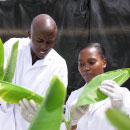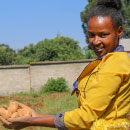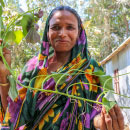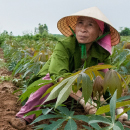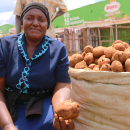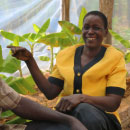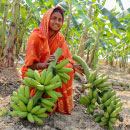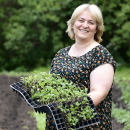From his home in Idi-Amu in Osun State Nigeria, Azeez Hameed Opeyemi can see a vast expanse of uncultivated land.
He sees that land as an opportunity for young people like him to start a livelihood, raise income and contribute to the food security of their immediate family and village.
The 29-year-old Azeez is bucking the trend which sees youth leaving rural areas. He represents a fraction of the smallholder farmers who are youths. Azeez inherited 10 hectares of land and learned to grow cassava and other crops from an early age. “Farming is my only source of income and my hope for getting a good education and achieving my future aspirations,” Azeez said.
Azeez was a participant in the International Institute of Tropical Agriculture’s (IITA) ongoing citizen science (Tricot) approach and tested three varieties of cassava as part of the Nextgen cassava project. He also participated in the youth research work carried out by IITA for Institute of Development Studies, United Kingdom. Azeez wants to help create awareness among his peers about evaluating and having access to these new cassava varieties. “It has been on my mind to venture into processing of cassava into gari, so if, after testing, I find these varieties marketable and profitable for gari, I will start a small gari processing factory since we do not have one in my village.”
One of the highlights was the motivation and inspiration he got from meeting the commissioner of youth in Osun State and the advice he gave him and colleagues at a recent workshop focussing on youth in agriculture. “I saw that my opinion mattered,” Azeez said. He realized during the meeting that there is dignity in farming, which is the backbone of Nigeria’s economy, and that the roles of male and female youths are valued and important. “I felt that I was appreciated and useful in decision-making for all youths and particularly the youths in my State.”
“Truly, there is reward in being loyal to one’s passion, not all rewards will be monetary,” concluded Azeez.

